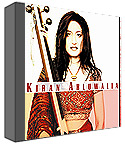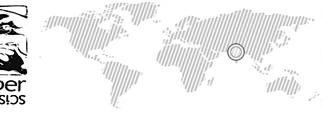LA Times, Indian vocalist adds to a classical form >>
The ghazal, a poetic song form that came to the Indian subcontinent from Persia in the 14th century, would seem to be a distant, highly esoteric form of expression to present to Western audiences. And, with its ancient roots and classical form, it would seem to be an even more unlikely medium for contemporary transformation.
But singer-composer Kiran Ahluwalia, who was born in northern Bihar and raised in New Zealand and Canada, is accomplishing both those tasks. Her performance at the Getty Center's Williams Auditorium on Saturday night illustrated her extraordinary success in bringing ancient and contemporary forms of ghazals to life while setting them in entertaining musical surroundings for 21st century Western audiences.
It was apparent from the moment Ahluwalia and her players arrived on stage that her program, the second in the Getty's annual "Sounds of L.A." series, would not be a typical concert of Indian music. Traditional instruments — the tabla drums of Naren Budhakar and the harmonium of Ashok Bidaye — flanked both sides of a carpeted platform, and Ahluwalia, garbed in a colorful Indian outfit, held a classical, drone-sounding tambura.
But at stage center, Rez Abbasi's amplified acoustic guitar and Dave Phillips' electric bass added a distinctly contemporary presence.
Ahluwalia's music blended these disparate elements superbly, her crystal clear voice arching airily above rhythms that generally coursed through audience-friendly 4/4 and 6/4 meters rather than the complex paradigms of classical Indian ragas. She sang ghazals, ancient and contemporary, as well as traditional Punjabi songs.
Refusing to view the ghazals as a form locked in the past, Ahluwalia has worked with contemporary Indian-Canadian poets to create original material, composing music for new ghazals such as "Vo Kuch" (lyrics by Tahira Masood) and "Yeh Nahin" (lyrics by Rafi Raza).
The Punjabi songs, especially the humorous "Meri Gori Gori" ("Yellow Bangles") and "Koka" ("Fickle"), added an engaging blend of wit and melodiousness to an evening of fascinating, newly revealed music.
by Don Heckman
03/07/06 >> go there



